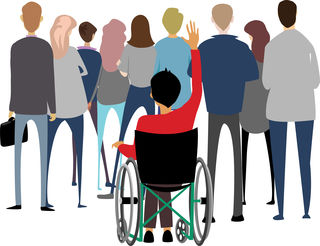Empathy
How to Help People with Disabilities Feel Welcome
Four simple behaviors can reduce awkwardness and intimidation.
Posted December 29, 2018

It has been a couple decades since an automobile accident on a cold winter's night left me with a quadriplegia diagnosis and a lifetime supply of power wheelchairs. I sustained a spinal cord injury during my junior year of high school. I overcame most aspects of spinal cord injury very well. The accident occurred and nothing could change that so I focused on what I could change. There was, however, one aspect of spinal cord injury that I didn’t overcome until very recently – and I’m not alone in it.
I have worked with a lot people who have had intellectual and physical disabilities. One of the first things I realized is that most disabilities are unique to the individual. Ten people with the same diagnosis will most likely be living ten different lives – each filled with different challenges and experiences. Common themes do exist; and perhaps one of the most common is that it can be very uncomfortable to be the only person in the room with a disability. The more severe the disability, the more uncomfortable it can be. So what can you do to minimize that discomfort in someone with a disability? The answers are easy.
Be kind and polite. This may sound like an obvious answer but the world has changed a lot in the 22 years that I have been a quadriplegic. Many years after my accident were spent enduring constant stares, occasional whispers, and even laughter on rare occasions. I actually stopped going to the mall because I felt like some sort of carnival attraction. So introduce yourself instead of staring, and if a question isn’t appropriate to ask someone, then don’t whisper it to your friend or partner.
I’m happy to report, however, that people are a lot better today. There is without a doubt much more empathy towards people with disabilities than ever before. There are still regressive people out there, but most people with disabilities know that those regressive people likely have personal issues that have made them the way they are.
Words and tone matter. Avoid using words and tones that belittle or infantilize people. This mostly occurs when people who genuinely mean no ill intent simply speak without thinking. A desire to fill an awkward silence is typically the main culprit. Some people simply don’t know what to say, and fear appearing rude, so they say the first words that come to mind.
Every person with a disability has their own pet peeve words and phrases, and most won’t hold them against you. In all honesty it’s usually the tone that pushes people over the edge, and that’s the easiest thing to avoid. Just focus on talking to people with disabilities like they have serious careers, families, and talents – because they do.
Be approachable and be the approacher. Even people who are completely comfortable being the only person in the room with a disability will quite often encounter one major problem – the room. I can’t tell you how many events I have attended in spaces that were like labyrinths to navigate. Networking events tend to be the worst for some reason. If you see someone in the room using a wheelchair or assistive walking device, then try to discreetly get people to keep some paths clear for them.
There’s a trick for when the room is too congested to discreetly keep a path clear. Simply go to the person and talk to them. Then pick someone in the room that you want to introduce them to and ask them if they want to go over to meet them. That gives you an excuse to say clear the way folks without it being weird, and then the folks know to be more aware.
Be yourself, for better or worse. One difficulty for people with disabilities is that they never really know where they stand with some people. You can be kind, polite, and the approacher without developing a full-fledged relationship with someone you don’t want to be friends with. I’m a person with a severe disability who is heavily involved with government on the city, county, and state levels. Political relationships are generally confusing and the quadriplegia sometimes adds an additional layer of confusion. So if a polite hi how are you is all you want to do then that is completely fine.
You don’t have to be an able-bodied ambassador to every disabled person you see. Just remember that there are meaningful and simple things that you can do to help people with disabilities feel more comfortable. You might just be the only person in some rooms who makes the effort to do so. It took me 22 years to realize that I had become comfortable in any social situation. It wasn’t until my baptism in October that I realized I had done it. I had cameras and lights on me, but the very large room was full of people who do what I just outlined here.




